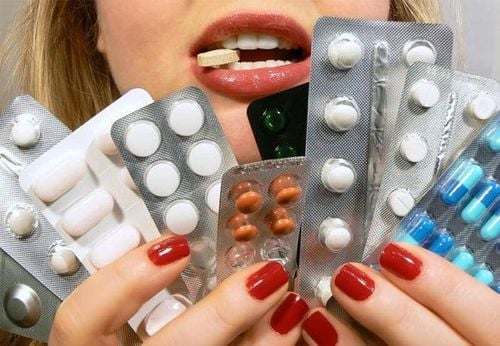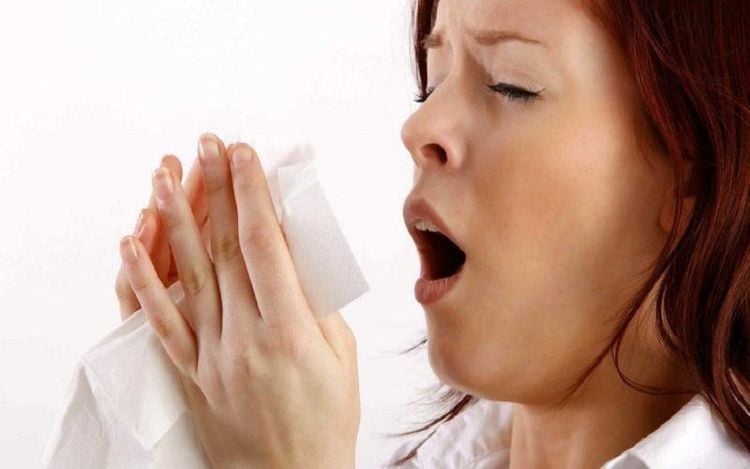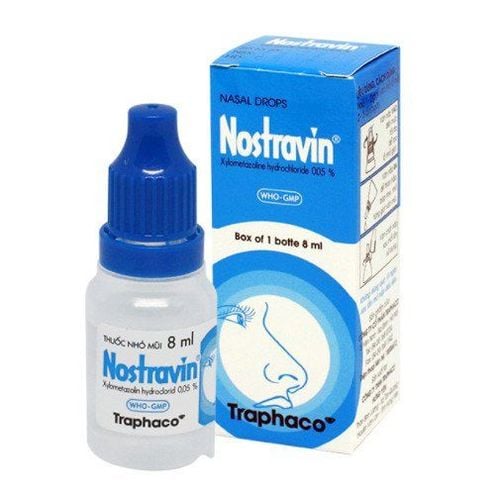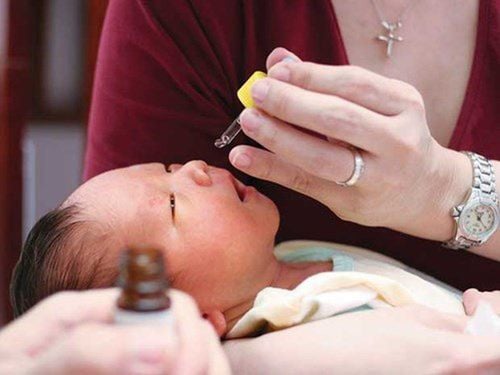This is an automatically translated article.
Allergic rhinitis is a common disease, especially during the changing seasons. The disease will cause symptoms such as sneezing, stuffy and runny nose, ... seriously affecting the quality of life as well as work of the patient. The drug classes to treat allergic rhinitis currently mainly relieve symptoms but cannot completely cure the disease.
1. What are the symptoms of allergic rhinitis?
Symptoms of allergic rhinitis can vary from person to person, but the common ones are:
Sneezing: This is a typical manifestation of allergic rhinitis. When sick, the patient will often sneeze suddenly. People with allergic rhinitis when it is cold or the weather changes suddenly will often sneeze more. In addition, it may be accompanied by a headache caused by muscle spasms when sneezing. Itchy nose: This symptom is common in allergic rhinitis and makes the patient very uncomfortable. Not only itchy nose, the patient will sometimes also have an itching sensation spreading to the throat, eyes, outer ear canal or itching on the skin of the neck. Runny nose: The common initial symptom in people with allergic rhinitis is a runny nose in both, this time the nasal discharge is usually odorless and transparent. However, in cases of superinfection, the nasal discharge will become cloudy and may be yellow or green in color. A runny nose usually occurs after sneezing. Nasal congestion: The patient may have stuffy nose or both. This condition is caused by swelling of the nasal mucosa and excessive runny nose. It makes the patient uncomfortable and has to breathe through the mouth. Fatigue: In addition to the symptoms mentioned above, the patient will feel sluggish, tired, headache, affecting the quality of life and work.

Thuốc trị viêm mũi dị ứng giúp làm giảm triệu chứng
2. Drugs for the treatment of allergic rhinitis
2.1. Antihistamines Antihistamines are a group of drugs commonly used in the treatment of allergic rhinitis. Histamine is one of the chemical mediators that play an important role in allergic reactions. When you have allergic rhinitis, the allergens will stimulate the release of histamine, causing symptoms such as sneezing, runny nose, itchy eyes, itchy nose, ... Therefore, antihistamines are very effective. effective in the treatment of allergic rhinitis. The first generation H1 antihistamines such as diphenhydramine, chlorpheniramine, promethazine have relatively good anti-allergic effects but can also cause many side effects such as drowsiness, dry eyes, constipation, dry mouth, blurred vision, etc. ... To overcome the above disadvantages, 2nd generation H1 antagonists such as cetirizine, loratadine, fexofenadin, astemizol... were born and used more and more widely.
2.2 Nasal Sanitizers Currently on the market there are many types of physiological saline 0.9% NaCl that works to clean the nose and throat, soothe the nasal mucosa, support respiratory secretions and improve nasal dryness. These spray bottles have almost no side effects when used. Therefore, the drug can be used for both young children, infants, pregnant or lactating women,... Especially for children, the way to wash the nose with physiological saline will be different from people's. great. Therefore, parents need to follow the instructions on the product or the doctor's instructions to manipulate it properly, avoiding pain or damage to the baby's nasal mucosa.
2.3 Decongestants Drugs in this group have vasoconstrictor effects, so they are very effective in clearing the nose, helping patients relieve nasal congestion quickly. Medicines that can be given as a nasal spray, nasal drops, or oral form, include active ingredients such as pseudoephedrine or phenylpropanolamine. The side effects of these drugs are tremors, palpitations, palpitations, and urinary retention. Phenylpropanolamine can cause a cerebrovascular accident, although very rarely. These drugs work quite quickly, so they are easy to abuse.
Note, the drug should only be used within 7 days because prolonged use may be resistant to the drug. With prolonged use, nasal congestion can return and even worse, habitual patients will use more decongestant sprays. This will create a pathological spiral. As a result, it leads to chronic drug-induced rhinitis and is very difficult to treat. Therefore, do not abuse the drug and need to follow the instructions of the doctor.
2.4 Corticosteroid spray nasal spray for allergic rhinitis containing corticosteroids is very effective in treating the disease. The drug works to reduce symptoms such as itching, runny nose, especially nasal congestion leading to loss of smell. However, unlike decongestants that cause vasoconstriction, the effect is rapid after use. These drugs take effect after about 3 days of use. Therefore, patients need to persevere in using the drug, not to quit halfway.
Sprays have almost only local effects, are less absorbed into the circulation, so they are relatively safe. However, you must not abuse corticosteroids, but need to use them as prescribed by your doctor or pharmacist at the pharmacy.
2.5 Oral corticosteroids Oral corticosteroids are quite effective in the treatment of allergic rhinitis. However, the drug is rarely used due to many unwanted side effects, especially if used in high doses for a long time such as stomach ulcers, osteoporosis, adrenal insufficiency, hyperglycemia,... In these cases Severe rhinitis, the doctor can weigh the benefits and risks to prescribe the right medicine for the patient and note that it is only taken for a short time, no more than 7 days.
For oral corticosteroids, patients should strictly follow the instructions of doctors and pharmacists, do not abuse drugs to avoid unpredictable consequences.
2.6. Antibiotics Antibiotics are used only when the patient with allergic rhinitis has a bacterial superinfection. The doctor may prescribe antibiotics of the Penicillin, Cephalosporin or other groups depending on the patient's condition. When using antibiotics, patients need to absolutely follow the correct course to avoid antibiotic-resistant bacteria.
In addition, in case of severe allergic rhinitis, especially with severe deviated nasal septum, the doctor may prescribe surgical methods to treat.

Cần áp dụng các biện pháp phòng ngừa để ngăn viêm mũi dị ứng tái phát
3. What is the prevention of allergic rhinitis? The above medicines for allergic rhinitis have the effect of reducing the symptoms of the disease and improving the quality of life, but cannot cure it completely. Patients should note to apply some of the following measures to prevent recurrent allergic rhinitis:
Avoid contact with allergens such as dust, pollen, perfume, cat hair, dog hair, smoke. cigarette,...; Should clean the house, create a clean and hygienic environment; Absolutely do not abuse drugs, use the right dose and time as prescribed by a specialist; Humidifiers, air purifiers, etc. can be used to filter out dust and reduce allergies. In addition, it is also possible to steam the nose with medicinal herbs such as ginger, lemongrass to improve some symptoms of the disease; While using the drug, if there are signs of side effects, it is necessary to immediately notify the treating doctor to find the appropriate solution; Note to keep warm when the weather is cold; If allergic rhinitis recurs frequently and affects your quality of life, you should see your doctor for an allergen test. Allergic rhinitis is a common disease. Although the disease is not dangerous, it greatly affects the quality of work and life of patients. In addition to using medications to treat allergic rhinitis as indicated, patients should take preventive measures to prevent allergic rhinitis from recurring.
Please dial HOTLINE for more information or register for an appointment HERE. Download MyVinmec app to make appointments faster and to manage your bookings easily.













